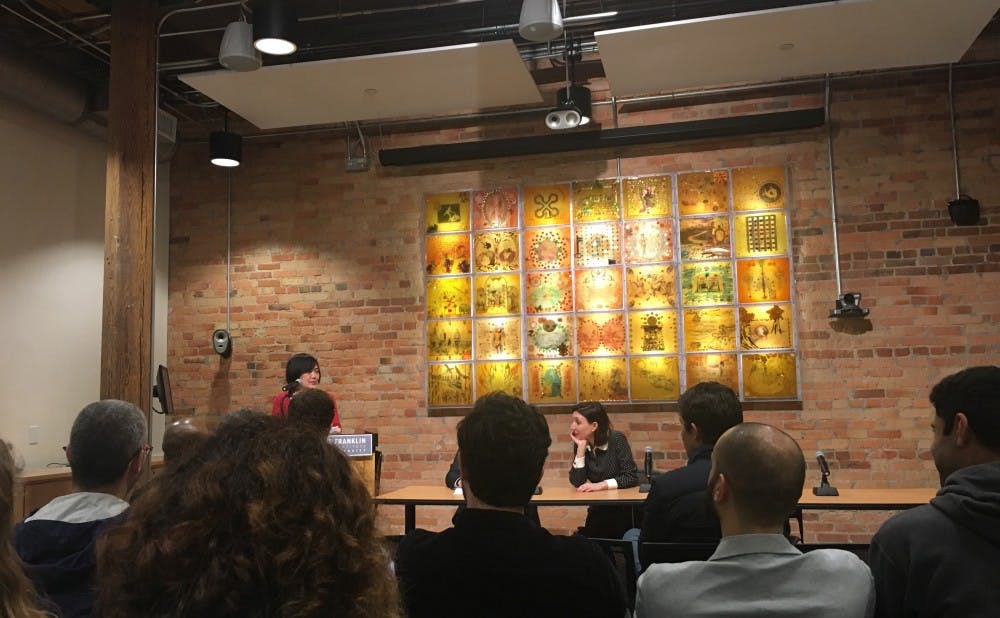Given the advent of streaming giants, the trend of binge-watching and the ever-growing mergers of content-creators in the film and television industry, it seems fitting to address whether the common account of cinematic theory holds true under these new conditions. To reevaluate its past and the future was the objective of a mini-conference held Friday at the Franklin Humanities Institute, under the title “On Cinema.”
The symposium’s subtitle, “Il n’y a pas de rapport audio-visuel” (“There is no audio-visual rapport”) itself was a subtle pun on the infamous dictum, “There is no sexual rapport,” by French psychoanalyst Jacques Lacan. The French slogan already indicates the provenance of most of the topics discussed, since, as speaker Fredric Jameson, Knut Schmidt Nielsen Professor of Comparative Literature, began, any contemporary thought on the moving image must grapple with the two heydays of film theory: the early Soviet era and 1960s France.
Jameson, professor of literature at Duke, delivered the first talk titled “Dilemmas of Film Theory Today.” First, he emphasized the distinction between philosophy and the now-canonical “theory.” Whereas philosophy always ends up constructing all-encompassing systems like those of Johann Gottlieb Fichte and Georg Wilhelm Friedrich Hegel, “Theory” allows for an unassimilable object that refuses to fit in a generalized account.
Two factors, he said, were quintessential for any contemporary theorizing on cinema: digitization and financialization. Evoking Michel Foucault’s notion of “capillary power” — power that is diffused and circulated throughout the entirety of society — Jameson argued that these two factors manage to penetrate every nook and cranny of contemporary life. Based on a reading of Dennis Broe’s recent book “Birth of the Binge,” he analyzed the consequences that the turn towards seriality has on the quality of leisure time. In an increasingly stratified and competitive economic order, even free time becomes structured according to logic of the market. This trend is in turn reflected by the production of cinema and the turn towards TV shows. Leisure time then turns into “leisurality,” the enjoyment of a few short sprees of free time while traveling between jobs and other obligations, rather than genuine freedom from obligations and appointments. “Some of us now find the short duration of movies boring compared to the endlessness of series,” Jameson concluded.
Next was Pietro Bianchi, whose talk was titled “The Restlessness of The Imaginary.” Bianchi, who recently obtained his Ph.D. from Duke’s department of romance studies, discussed the problem of sight in the work of Jacques Lacan. The latter first used the term “vision” in the 1940s and 50s, only to advance the notion of the “gaze” in the 1960s. That gaze, as Bianchi explained, fundamentally questions whether vision can be understood as a line between two points. It is not just the object looking back at its beholder, but also a radical challenge to the possibility of their relation. This object gaze cannot be localized and, as he argued, constitutes a major issue for the theorization of film in the present day.
Bianchi analyzed science-fiction author H.G. Wells’ short story “The Country of the Blind” to illustrate his argument. In the story, a mountaineer accidentally discovers an isolated community inhabited exclusively by blind people. Motivated by the proverb "In the Country of the Blind, the One-Eyed Man is King," he attempts to use his vision to seize control of the community. However, he eventually realizes that the blind have adapted to their predicament so completely that, instead, the mountaineer comes to experience his fifth sense as a disadvantage. Being the only sighted person in the village, he constantly questions whether the events he sees are real or mere illusions, leading to growing frustration. The story, Bianchi argued, showed that vision is far more than the innocent sense it is commonly perceived as, intensifying the need for its theoretical articulation in cinema studies.
After Bianchi, Anne-Gaëlle Saliot spoke on “Jean-Luc Godard’s Europe: Geopolitics of the 19th Century.” An associate professor of romance studies at Duke, Saliot discussed the European idea and its rooting in the 19th century as deciding factors for French-Swiss Filmmaker Godard, who is widely reputed as the “enfant terrible” of 1960s French New Wave film. Based on his well-known appreciation of German romantic authors like Novalis, Lenz or Hölderlin, Godard’s work adheres to a concept that sets the idea of Europe equal to the fate of cinema. “I loved Mao as I loved Goethe,” she quoted him. As such, Saliot argued, the 19th century provided a sort of “political unconscious” for Godard, which reverberates in his idea that the filmmaker effectively works as a historian.
The second session of the day was led by three faculty members from the University of Maryland: Luka Arsenjuk, who discussed the problem of audio-vision in Soviet filmmaker Sergei Eisenstein, Eric Zakim covering “The Problem of Music at the Movies” and Mauro Resmini analyzing the work of Italian director Pier Paolo Pasolini and an “ethics of autonomy.”
If anything, the symposium gave students and faculty a taste of the vast range of material that contemporary theoreticians ought to devote their attention to. In what has been called “a golden age of television,” series and streaming have become invaluable objects of cultural inquiry, and an understanding of the present can only be achieved through our relationship to those contemporary media, even if it is the latest season of “Game of Thrones.”
Get The Chronicle straight to your inbox
Sign up for our weekly newsletter. Cancel at any time.

